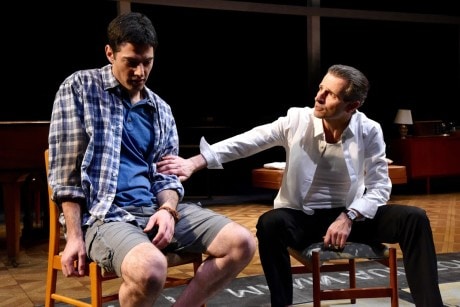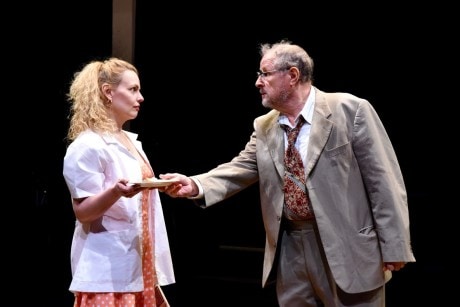When you decide to be a dissident artist–think Paul Robeson–you’d better be willing to suffer the consequences.

When you challenge a nation’s founding mythology, an emotional backlash is guaranteed.
In keeping with his dissident reputation, Motti Lerner and his After the War, a world premiere at Mosaic Theatre’s Voices of a Changing Middle East Festival, tackles that most volatile of subjects: the artist who confronts the ethical framework of a nation, at war and after.
Unfortunately, After the War, translated by Roy Isacowitz, loses its focus, wavering murkily between the cold realities of a family torn to pieces and a more metaphorical vision rooted in the power of art to unite and heal.
Directed by Sinai Peter, After the War stars Paul Morella as Joel, a celebrated pianist who returns to Israel after 18 years, following his self-exile, which followed his father kicking him out of the family home because his son challenged Israel’s moral behavior.
Over those 18 years Joel built a career and family in New York.
Now, however, his wife has divorced him; and his son, Izzy (played hauntingly by Guy Kapulnik), has joined the Israeli army and fought in the 2006 Second Lebanon War. Joel comes back to Israel to find him.
On the flight over, he just happens to sit next to the renowned conductor Zuben Mehta whose featured pianist is suddenly unavailable. Joel is offered a concert with the Israel Philharmonic Orchestra, and that’s where the play’s difficulties begin to emerge.
If the personal is the political, Mr. Lerner has failed to deal forcefully with his own play’s most fervent political issue: Joel’s estrangement from his son, Izzy, which parallels in mirror Joel’s estrangement from his own father.
Instead, the play and Joel get sidetracked by aesthetics, sexual dalliances, and “the larger picture.”
If that was the supposed point of After the War, then Lerner succeeds only in presenting the absence and denial of the situation, not in shedding light on the condition. There are so many gaps and confusions in the backstories of the characters, particularly Joel’s, that it is difficult to know who is the most reliable narrator.
As a result, Mr. Morella’s Joel doesn’t win much sympathy from me.
We want to admire his courage in standing up for wounded innocents, even if those despised innocents are on the other side of the battle lines; but his incredulously naive understanding of the consequence of his actions (has he not studied the lives of dissident artists even in democracies?), left this viewer confused more than admiring.
Joel is not alone, however, in this sympathy gap, as each of the characters is burdened with his or her own ethical failing and self-righteousness. Even Kapulnik’s Izzy, whom we thought was a wounded soldier, slips into confusion after some too cryptic light is shed on the cause of his wounds.
Joel’s mother, Bella, is played by Barbara Rappaport, while his brother, Freddie, is played by James Whalen. Both Rappaport and Whalen give their best but struggle to ground their characters in the play’s challenging emotional terrain.

Trudy and Bernard, two recent immigrants from Ceausescu’s Romania, fare somewhat better. Tonya Beckman and Michael Tolaydo take on the “odd couple,” and give them a life beyond the text. Tolaydo’s Bernard, as the play’s comic relief, might not be a welcome house guest but he couldn’t be funnier.
Mr. Peter’s direction keeps the play engaging until the text’s focus begins to waver.
The design team, led by Frida Shoham’s sets and costumes, captures the competing interests between family and music, as Tel Aviv’s Fredric R. Mann Auditorium, home of the Israel Philharmonic, remains forever upstage of the family home.
There’s no question, that in this time of endless war, between Israel and its neighbors, and America and an extremist insurgency, that the ability of artists–or just ethically free thinking people–to address issues of human rights is under threat.
A rising nationalism is sweeping the world, and the artist who stands up against this xenophobia and reaches across cultural and religious lines frequently loses audience, funding, and status.
In keeping with Mosaic’s groundbreaking season, After the War raises the issues of an artist’s relationship to his or her community during times of stress. What happens when the community’s values and actions conflict with the artist’s own? Does the artist follow the community? Or does the artist play it safe, producing art that only sings an aesthetically pleasing note?
Nobel Poet Saint John Perse may have been right when he said that it “is enough for the poet to be the guilty conscience of his time,” but when the artist steps out of that aesthetic realm and into the realm of the political activist, speaking directly to the guilt, then he (or she) will suffer the ramifications, even in the best of democracies.
Running Time: One hour and 45 minutes, without an intermission.
After the War plays through April 17, 2016 at Mosaic Theater Company of DC performing at Atlas Performing Arts Center – 1333 H Street NE, in Washington, DC. For tickets, call the box office at (202) 399-7993 ext. 2, or purchase them online.
LINK:
Magic Time! ‘After the War’ at Mosaic Theater Company of DC by John Stoltenberg on DCMetroTheaterArts.
RATING:





